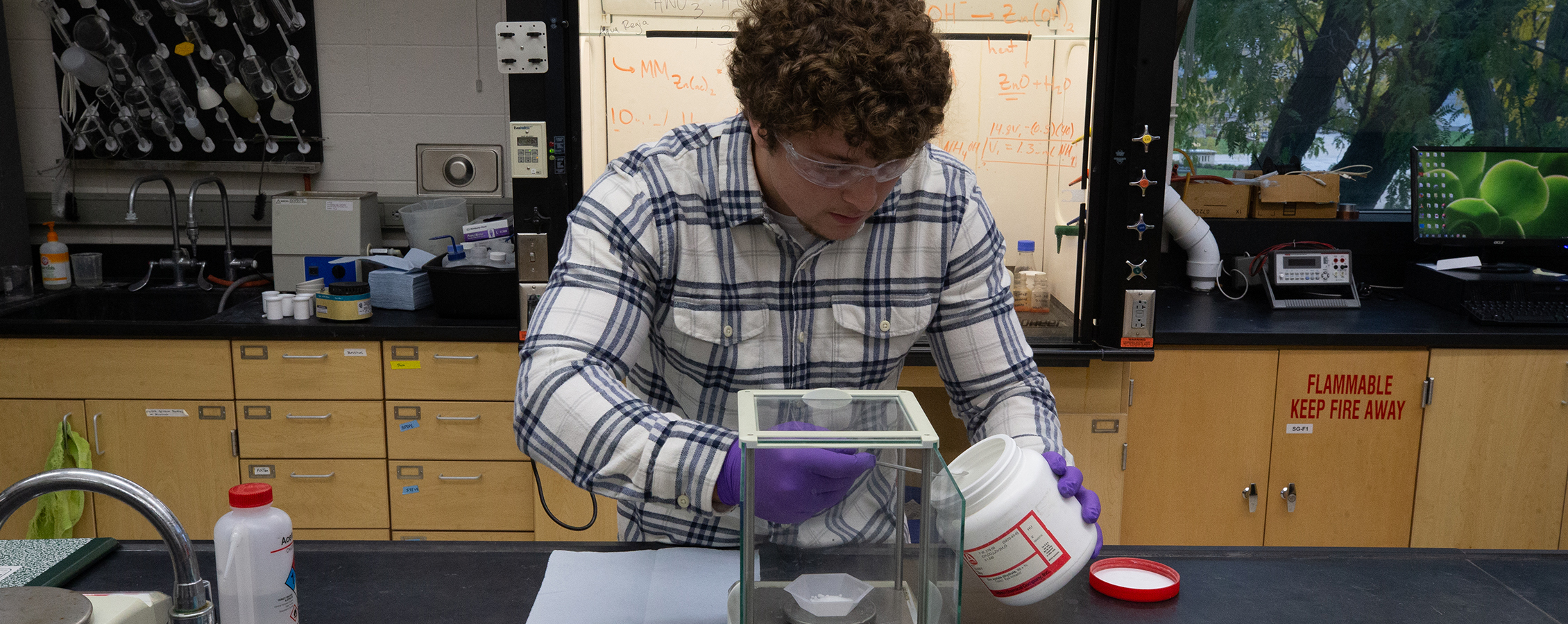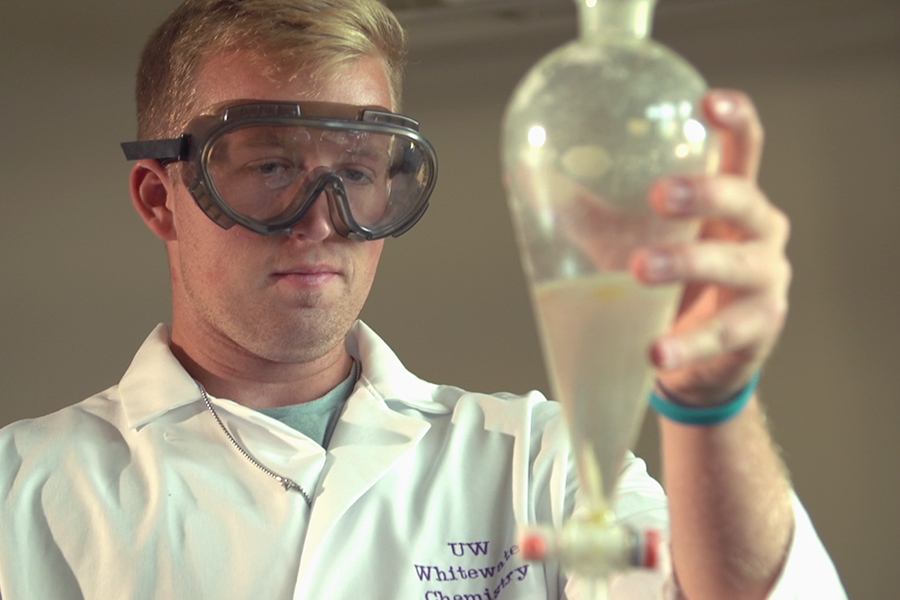Launching excellence in the lab: Warhawk Nick Barmore earns NASA grant
November 24, 2023
Written by Chris Lindeke | Video by Kyle Winter | Photos by Craig Schreiner
From stargazing as a child in his hometown of Evansville to working as an undergraduate researcher inside the University of Wisconsin-Whitewater’s Upham Hall, Nick Barmore has always had an interest in space.
That passion, combined with the support of UW-Whitewater’s chemistry department, earned Barmore a prestigious $4,000 grant from the National Aeronautics and Space Administration (NASA) and Wisconsin Space Grant Consortium (WSGC) as part of the Undergraduate Research Awards Program.
According to the WSGC web page, the Undergraduate Research Awards Program provides awards to qualified students from WSGC Affiliate Member colleges and universities to create and implement a small research study of their own design that is directly related to their interests and career objectives in space science, aerospace or space-related studies.
Barmore received notification of earning the grant about one week after the anticipated date of the announcement, so the late-night email he received came as a surprise.
“I remember the email had confetti dropped down from the top, so I thought it was so fitting, so amazing,” Barmore said.
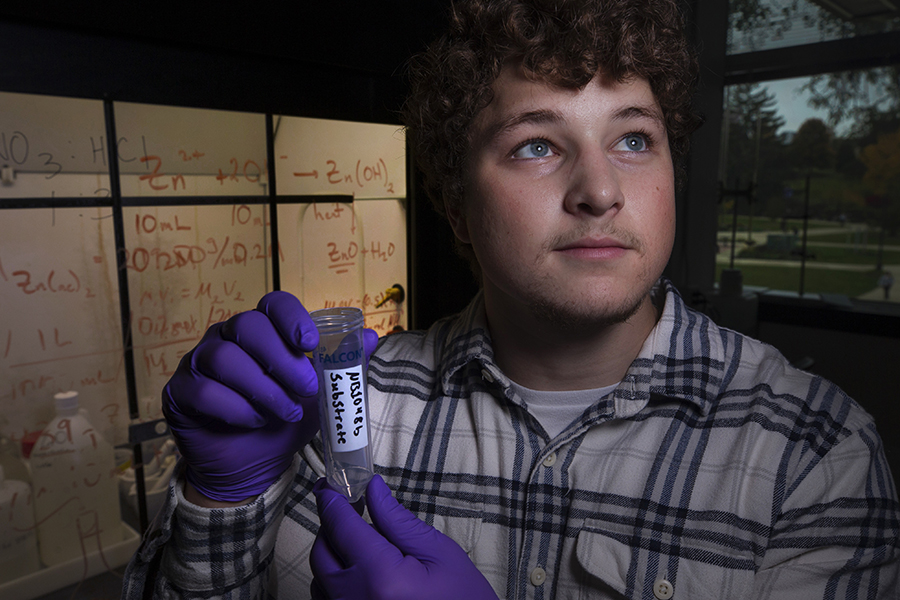
Nick Barmore, a chemistry student who is working on an undergraduate research project with Steven Girard, associate professor of chemistry, has been awarded $4,000 for his ongoing research on sensor materials. He is shown in Girard's lab on Wednesday, Oct. 25, 2023.
Barmore, a chemistry major, is one of nine college students in the state to earn the grant to fund his ongoing research. His research project, titled “Nanostructured Zinc Oxide Gas Sensors for Space Travel,” studies how to create nanostructured zinc oxide gas sensors that are inexpensive, nontoxic and easily producible. The goal of the study is to increase the safety of space travel and reduce the cost and labor of creating spacecraft.
Barmore starts by dissolving a series of chemicals in water. A glass slide is added, and is heated overnight in an oven. Once the solution is pulled from the oven, Barmore analyzes the whiteish coating of nanostructured zinc oxide, conducting X-ray diffraction and scanning electron microscopy (SEM), and then analyzing the data on a computer.
“The sensors are pretty cost efficient compared to some other sensors,” Barmore said. “Metal oxide semiconductors sensors are pretty widely known. Those are the type we’re working on. They’re really cheap and they’re nontoxic. They’re really easy to make because it only takes about a day to make them.”
Steven Girard, an associate professor of chemistry at UW-Whitewater, serves as Barmore’s faculty advisor for the project. Girard has been a faculty member in chemistry since 2014 and is the university’s campus representative to the WSGC and a member of the organization’s advisory panel.
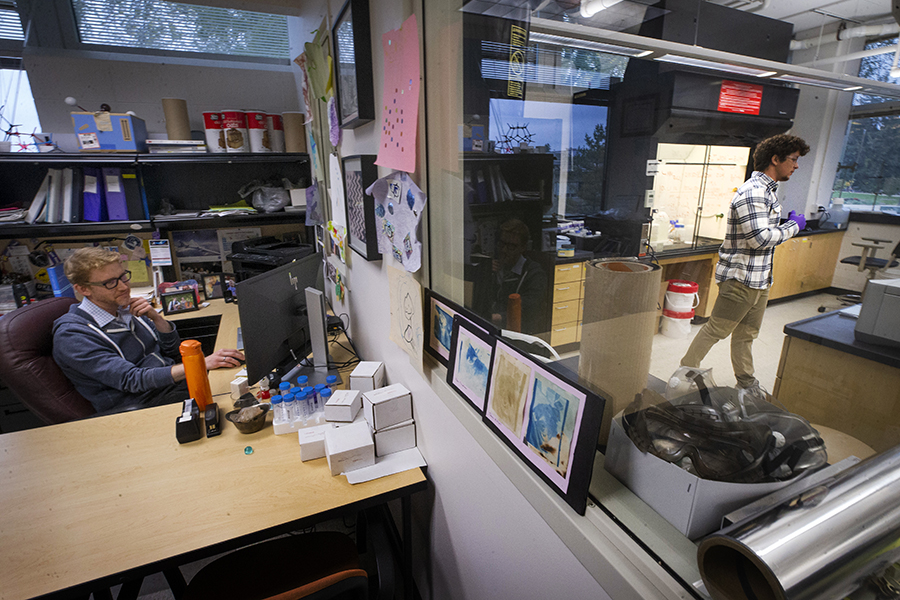
Nick Barmore, right, a chemistry student from Evansville, is working on an undergraduate research project with Steven Girard, left, associate professor of chemistry, in Girard's lab on Wednesday, Oct. 25, 2023.
Barmore's undergraduate research is now embedded into the chemistry department curriculum, specifically in the department’s Inorganic Chemistry course.
“The main goal of this research is to provide really substantive, hands-on training for our undergraduates so they understand what it takes to do research, what it means to develop an experiment from scratch, to actually do a research experiment where they don’t understand what the outcome is going to be, and to go through the process of doing research and the discovery,” Girard said. “This is why we do science. It’s the living, breathing part of what we do.”
Barmore and two other UW-Whitewater students have been engaged in the research topic under Girard’s supervision since the Fall 2022 semester. Barmore, whose focus within the research project is specifically tied to the NASA/WSGC grant, expressed his passion for conducting research and his gratitude for Girard’s mentorship along the way.
“Our professors and instructors are a lot smarter than we are by virtue of experience, so sometimes breaking it down into digestible bites is pretty difficult,” Barmore said. “I think Dr. Girard does that so well — he really helps me understand why I’m doing what I’m doing.”
Girard uses a hands-off approach as an advisor, one that allows students to work independently with limited intervention. He emphasized the ability of students to work in a small classroom environment as a key to their success — an advantage that Barmore also cited.
“At a larger school, you might not have the opportunity to use the high-pressure liquid chromatograph or run the powder X-ray diffractometer yourself, and you probably won’t learn how these machines necessarily have to be repaired,” Girard said. “But here, because of our smaller class sizes and a more direct faculty-to-student mentorship, we have the opportunity to really impart those skills with our students.”
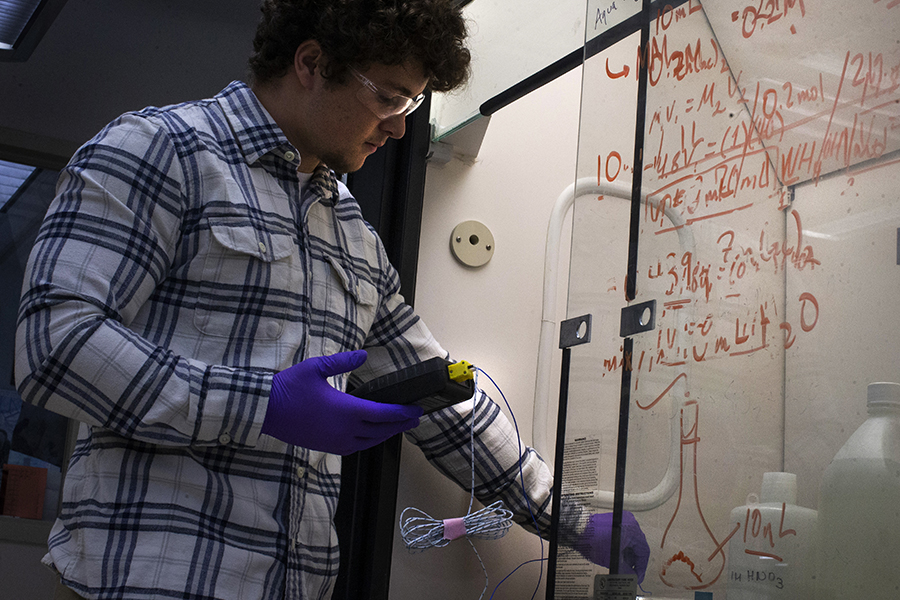
Nick Barmore works on an undergraduate research project in a lab on Wednesday, Oct. 25, 2023.
Barmore attended UW-Whitewater at Rock County for one year before joining the student body on the Whitewater campus. He is a third generation Warhawk as both his parents and his grandmother attended UW-Whitewater. He credits his father and grandmother for nurturing his love of science.
Over the summer, Barmore was one of eight students to represent the university at the 2023 WiSys Spark Symposium, an annual event that brings together high-level faculty, staff, students and alumni from across the Universities of Wisconsin to network, collaborate and celebrate ideas. The three-day event showcases student and faculty research and brings together expert panels on research, innovation and entrepreneurship. He also recently presented his research at UW-Whitewater’s Undergraduate Research Program Undergraduate Research Day.
Barmore, a UW-Whitewater Writing Awards scholarship recipient, is slated to graduate in May 2025. He hopes to attend graduate school and work in the astrochemistry field.
“I honestly am impartial to where I work as long as I find the work fulfilling,” Barmore said. “If that’s with NASA, that’s awesome.”
Girard considers himself lucky to work with Barmore and the other talented students at UW-Whitewater through undergraduate research and his courses.
“Coming to work every single day, I get to work with students that are excited and engaged and curious and smart,” Girard said. “They will constantly push me outside of my comfort zone and provide interesting questions for me to consider in many cases that I don’t know the answer to, and we can actually have a dialogue and think a little bit about that.”

